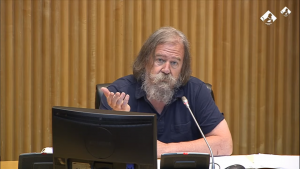 On June 22, UB researcher Daniel Raventós intervened before the Commission for Social and Economic Reconstruction of the Congress of Deputies in Madrid.
On June 22, UB researcher Daniel Raventós intervened before the Commission for Social and Economic Reconstruction of the Congress of Deputies in Madrid.
Prof. Raventós outlined his proposal of Universal Basic Income (UBI) starting by defining this economic measure as a public monetary payment to the entire population on an individual, regular, unconditional and universal basis.
In the past 40 years, Spain has been the OECD country that experienced the longest periods with an unemployment rate that exceeded the 15% of the labor force, and another 15% of wage earners live currently under the poverty threshold. According to prof. Raventós, this condition is very unlikely to change in the short term, leaving millions of people in a situation of fragility for the years to come.
Given this assumption, prof. Raventós gave some key points of his proposal:
- A monthly stipend of €715 would be granted to all citizens or legal residents, in spite of their employment status.
- The UBI should be universal (like it is today the Healthcare) since this would allow all citizens to enjoy real liberty, which is only achieved by fulfilling material conditions.
- The UBI should be unconditioned because subsides “ex-post” often generate systemic errors and/or lead to the non-take upof social benefits (persons entitled to receive financial subsidies who are unaware of their entitlement). A ground universal income would eliminate or reduce the disincentive of looking for a job that can occur when the subsidy is conditioned to the unemployment status.
- The UBI should be the result of a profound fiscal reform, where the 20% of the wealthiest people would see a rise in the wealth tax together with a possible remodelling of the IRPF income tax leading that would benefit the 80% of the population.
In prof. Raventós’s view, another positive aspect of this reform is the bargaining power that marginalized categories of citizens, such as women, would gain
In the video below you can watch the full intervention.

